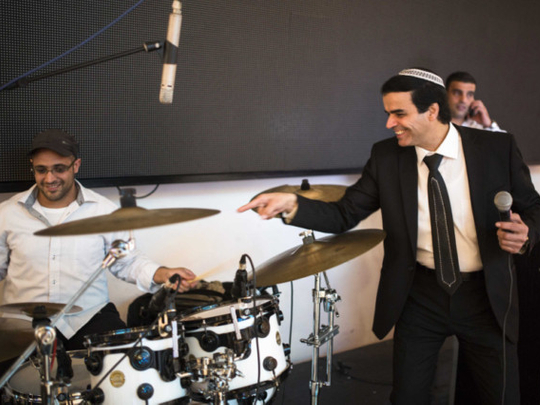
Occupied Jerusalem: An Israeli singer has become an unlikely star in Yemen, an Arab country where his hit songs blare from cafés and taxis.
Zion Golan’s parents were born in Yemen, but like other Israelis, he is banned from travelling to his ancestral homeland, which has no diplomatic ties with the Israeli regime.
Known in Yemen as Ziyan Joulan, his songs — whose Arabic lyrics are written by his mother-in-law — are distributed on bootleg CDs and downloaded from the Internet.
“Yemeni music is in my heart and in my soul,” Golan said.
“My big dream is to go to Yemen. My parents told me many stories about Yemen, about Sana’a, about Aden, all about Yemen, so I felt it was right to write, to perform songs in a Yemeni style, which I feel is part of me.”
In Sana’a, Waddah Othman, a doctor, grinned as he displayed an array of Golan’s songs on his mobile phone.
“I adore this singer,” he said.
Abdullah Al Haj, who owns a video and music shop in Sana’a, said music of Yemeni Jewish singers was in high demand by local youngsters, who increasingly are getting music off the Internet.
Golan said he receives no royalties for his music in Yemen, where the late Israeli singer Ofra Haza, who was also of Yemeni Jewish descent, was once popular.
“Ziyan Joulan is the greatest Yemeni singer,’ said Sana’a resident Ali Al Kinei, 43. “Jewish singers have kept the Yemeni musical traditions and developed them by introducing modern instruments ... I follow his songs on YouTube.”
Between 1949 and 1959, most of Yemen’s 50,000 Jews were taken from the homelands and flown to the new Israeli regime that was established in Palestine in 1948, in a secret operation dubbed “Magic Carpet”.
The new regime was in need of Jewish migrants in order to establish a Jewish majority on the land, thus significantly altering the country’s demographics. Many Yemenis are said to have faced discrimination at the hands of European Jews upon arriving.
Today, fewer than 200 still live in the Arabian peninsula state.
Golan, who learnt Yemeni Arabic as a boy, is one of about 140,000 of Israelis descended from Yemen’s ancient Jewish community, and he said that he was pleased his popularity there provided a bridge between two peoples.
“I enjoy that they are enjoying my songs, it makes me feel good,” he said. “I wish there will be peace and then we could connect, that would be the best dream for all of Israel.”












